One of the oldest cultural heroes in Chinese history, Fuxi is an important figure in Chinese mythology. Legend has it that the celestial entity Fuxi founded the first social structures of humanity, such as marriage, family units, and fishing, after descending from the skies.
who is fu xi?
Fuxi, one of the Three Sovereigns and Five Emperors, is considered the founder of Chinese culture and the earliest recorded king in Chinese literature. He was also known as Taihao or Huangxiongshi. Fuxi was believed to have lived during the Middle to Late Paleolithic period and is regarded as one of the pioneers of Chinese medicine. He is also known by various other names, such as Paoxi, Baoci, and Fuxi, and is referred to as Fuxi in the Records of the Grand Historian.
According to the myth, Fuxi was born during a time of chaos when humans were unable to coexist peacefully with each other. He was said to have been born from the union of a dragon and a phoenix and was raised by a bear. He had the head of a human and the body of a snake, which symbolized his ability to bridge the gap between the human world and the divine realm.
Fuxi is credited with many significant contributions to Chinese society. He is believed to have established the concepts of Yin and Yang, which represent the balance between opposing forces in the universe. He is also credited with inventing many essential tools and techniques that helped ancient Chinese people survive and thrive, such as the use of knots and cords for binding and tying objects, which led to the creation of the Chinese writing system.
Fuxi is also associated with many important cultural symbols in Chinese mythology, including the dragon, which is often depicted alongside him. The dragon is a symbol of power, wisdom, and good fortune in Chinese culture, and it is believed that Fuxi taught humans how to communicate with these mystical creatures.
Another significant contribution of Fuxi was the invention of the Eight Trigrams, which are the foundation of the I Ching, one of the oldest and most influential books in Chinese culture. The Eight Trigrams are said to represent the fundamental principles of the universe, and the I Ching is a guide for understanding how to live in harmony with these principles.
In addition to his practical contributions, Fuxi is also revered as a cultural hero and a wise teacher. His teachings on balance, harmony, and innovation continue to influence Chinese philosophy, art, and science to this day. Many Chinese people consider Fuxi to be a source of inspiration and a symbol of their cultural identity.
Fuxi is also associated with many important myths and legends in Chinese culture. For example, he is often depicted as the husband of Nuwa, another prominent figure in Chinese mythology who is credited with creating humans and repairing the sky. According to legend, Fuxi and Nuwa were the only humans who survived a great flood that destroyed most of humanity, and they went on to repopulate the world.
Fuxi’s image can be found in artwork and literature throughout China and other parts of the world. In modern times, he remains an important cultural figure in China, and his legacy continues to inspire Chinese people to this day.
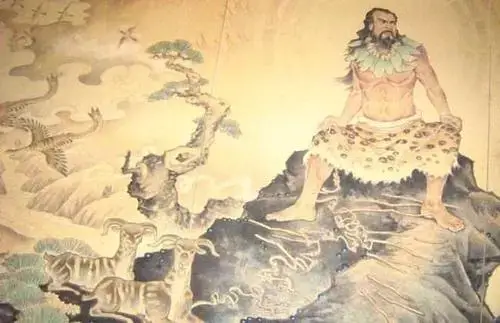
fu xi story
Fuxi’s mother was a woman from the country of Huaxu named Huaxu Shi. Huaxu Shi grew up in a prosperous kingdom and possessed an elegant and charming temperament due to her upbringing. She spent her days only doing one thing, which was traveling. She visited famous mountains and rivers, admiring the wonderful and beautiful natural scenery.
One day, she arrived at a place called Leize in the east and saw a giant footprint by the swamp. This footprint was said to have been left by the main god of Leize, the Thunder God, who was a heavenly god with a human head and dragon body. Huaxu Shi found this footprint very interesting and stepped on it out of curiosity. But as soon as she stepped on it, she felt a strange sensation in her body, and yes, she became pregnant. This child was none other than Fuxi.
what does the fu xi do?
From the records of the ancient Chinese classics, Fuxi’s contributions can be summarized in the following aspects:
- Fuxi created the Eight Trigrams, which opened up the cultural source of the Chinese nation. The holistic and intuitive thinking mode, as well as the dialectical thinking embodied in Fuxi’s Eight Trigrams, are the origin of Chinese culture.
- Fuxi taught people to make nets for fishing and hunting, which improved the productivity of human beings. At the same time, he also taught people to domesticate wild animals, which is the origin of domesticated animals.
- Fuxi reformed the customs of marriage, advocated the custom of men proposing and women marrying, and transformed the clan marriage into inter-clan marriage, which ended the primitive promiscuity where children only knew their mothers but not their fathers.
- Fuxi created a form of writing to replace the previous knot-tying recording method
- Fuxi invented musical instruments such as the clay ocarina and the zither, created songs and music, and brought music into people’s lives.
- Fuxi divided his ruling territory and appointed officials to manage society, providing a reference for future generations to govern society.
7.According to the “Changsha Bullet Library Chu Silk Book,” during Fuxi’s time, there already existed heaven and earth, but they were still a wasteland. Therefore, Fuxi married, had children, and named all things.
fu xi and nu wa
According to historical records, Fuxi is one of the “Three Sovereigns” in Chinese mythology. He created the Eight Trigrams, which opened the cultural source of the Chinese nation. The holistic and intuitive thinking and dialectical thinking embodied in the Eight Trigrams are the origin of Chinese culture. Fuxi also taught people to use nets for fishing and hunting, which improved human productivity. He also taught people to domesticate wild animals, which is the origin of domesticated animals.
Fuxi also transformed marriage customs and advocated the tradition of men proposing to women, which ended the long-standing primitive group marriage system where children only knew their mothers and not their fathers. Additionally, Fuxi created a system of writing, replacing the previous method of knot-tying for record-keeping. He also invented musical instruments such as the ocarina and the qin, and composed music, bringing music into people’s lives.
Furthermore, Fuxi divided his territory and appointed officials for social management, providing a reference for later generations to govern society. According to the Chu silk manuscript from the Changsha Bullet Library, during Fuxi’s time, there was already heaven and earth, but it was still a barren land. Fuxi married and had children, naming all things.
In Chinese mythology, Nüwa is the goddess of creation and is also known as the sister of Fuxi. She is said to have created humanity by molding figures out of yellow earth, and established the system of marriage. Later, when the world was in chaos, she melted colored stones to repair the sky and cut off the legs of a giant turtle to support the four corners of the world, leaving behind the myth of Nüwa mending the heavens.
Legend has it that Fuxi and Nüwa, who had a human head and a snake body, married and had children. Fuxi invented divination and the Eight Trigrams, while Nüwa created humanity and the system of marriage. Fuxi also taught people how to use nets to catch birds and fish, while Nüwa repaired the sky and supported the world. Fuxi’s mythical stories have been passed down for generations in Chinese culture.
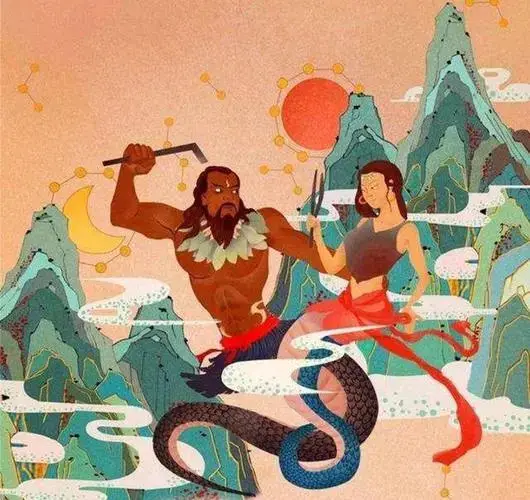
fu xi dragon
1. Fu Xi and Nu Wa were originally siblings, but later became husband and wife. They are referred to as “dragons”: legend has it that both Fu Xi and Nu Wa had human heads and dragon or serpent bodies, and they propagated the entire Chinese nation. That’s why the Chinese people call themselves “descendants of the dragon.”
2. Referring to Fu Xi and Nu Wa as dragons is due to the similarities between the divine dragon and the human ancestor. The significance lies in the interaction between humans and gods, complementing each other: Fu Xi and Nu Wa are compared to dragons, and their divine nature is greatly enhanced, while dragons are given a human touch by being compared to Fu Xi and Nu Wa. They then blend into the ancestral worship of the Chinese people as a symbol. Meanwhile, Fu Xi is a dragon, and Nu Wa is also a dragon. The union of the two dragons gave birth to and propagated the ancient Eastern ethnic group. The human ancestor is the ancestor of the dragon, and the descendants are naturally the “descendants of the dragon.”
3. Fuxi combined several beloved animals of the time to create a composite creature with features of a horse’s head, deer’s antlers, snake’s body, fish scales, eagle’s claws, and fish tail, which he named “dragon.” He referred to himself as the “Dragon Master,” and from then on, the dragon became the totem of the Huaxia people, and the Chinese nation began to be known as descendants of the dragon.
fuxi in yin and yang
According to traditional Chinese mythology and cosmology, Fuxi is often associated with the concept of yin and yang, which represents the dualistic nature of the universe and all things in it. Fuxi and his sister Nüwa are considered the creators of humankind, and are often depicted as having the bodies of serpents or dragons with human heads.
In the Yin-Yang theory, Fuxi is associated with yang, which represents the masculine, active, and creative force in the universe. He is said to have taught humans how to hunt, fish, and farm, and is credited with inventing the eight trigrams, which form the basis of the I Ching, a Chinese divination text.
Overall, Fuxi’s role in Chinese mythology and cosmology is significant as he is believed to have laid the foundation for the development of Chinese culture and philosophy, particularly in the areas of divination, astrology, and traditional Chinese medicine.
fu xi and Eight Diagrams
Fuxi was a gifted and insightful person who observed the changing seasons, the cycle of life and death, and the passing of time. He wanted to represent all things in the world with something symbolic. Legend has it that one day, a dragon horse emerged from the Meng River.
According to “The Record of Dragon-Horse,” “The dragon-horse is the essence of heaven and earth. Its form is that of a horse with dragon scales, hence the name dragon-horse. It is eight feet and five inches tall, with wings like a pheasant, and can walk on water without sinking. When a sage is in power, it emerges from the Meng River carrying a picture on its back.”
Fuxi saw the picture on the dragon-horse’s back and used it to create the eight trigrams, which are composed of Qian (Heaven), Kan (Water), Gen (Mountain), Zhen (Thunder), Xun (Wind), Li (Fire), Kun (Earth), and Dui (Lake).
Qian represents Heaven, Kun represents Earth, Kan represents Water, Li represents Fire, Gen represents Mountain, Zhen represents Thunder, Xun represents Wind, and Dui represents Lake (a place where water gathers, such as a river or a lake).
From then on, the Chinese people began to use the yin-yang theory and the eight trigrams to explain the laws of evolution of all things in the universe, as well as the order of human relationships.
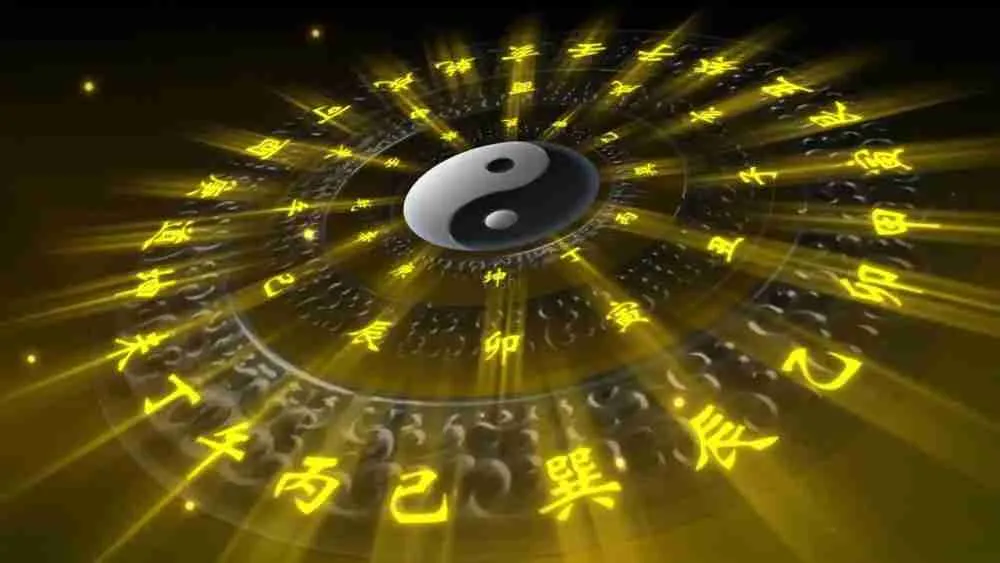
fuxi in Taoism
Fuxi is an important figure in Taoism and is revered as one of the Three Sovereigns and Five Emperors. He is considered to be a legendary sage and cultural hero who played a key role in the development of Chinese civilization.
In Taoism, Fuxi is associated with the concept of the Taiji, or the Great Ultimate, which represents the ultimate unity and balance of the universe. It is said that Fuxi observed the patterns of nature and the movements of the stars and planets, and through his insights, he developed the Taiji diagram, which is a symbol of the dynamic interplay between Yin and Yang.
Fuxi is also associated with the Bagua, or the Eight Trigrams, which are used in Taoist divination and fortune-telling. The Eight Trigrams represent different natural phenomena and are used to understand the flow of energy in the universe.
In addition, Fuxi is said to have taught humans various skills and technologies, such as farming, fishing, and hunting. He is also associated with the development of the Chinese writing system and is said to have invented the Chinese musical instruments.
Overall, Fuxi is an important figure in Taoism who represents wisdom, balance, and harmony with the natural world.
Where is Fuxi from
The birthplace of Fuxi has been a topic of debate and attention in the academic community. It is generally believed that he was born in Chengji, Tianshui, Gansu Province, but there are also different opinions, including one that believes Fuxi was born in Henan Province.
Fuxi is the human ancestor of the Chinese nation and the founder of Chinese civilization. The academic community generally believes that Tianshui, Gansu is Fuxi’s hometown. However, a folk scholar named Bai Zongshang from Xingyang City, Henan Province, retired 10 years early and self-funded a survey around the Huancuiyu Fuxi Mountain in Xingyang. After more than a decade of research, he concluded that Huancuiyu Fuxi Mountain in Xingyang, Henan Province is Fuxi’s hometown.
fuxi tomb
It is said that Fuxi was buried in the area of Xiangyang. According to legend, Fuxi was born from the footprints of a deity at Leize in Huaxu, so after his death, his body turned into a range of mountains resembling human footprints, stretching across the south of Xiangyang (Zhongxian and Xianshou mountains), while the “rules and order” that govern the universe transformed into a group of mountains to the west (Shangxian mountains). These mountains were called the Xian Mountains due to their small size and treacherousness.
Huaiyang is known as the “ancient capital of Emperor Fuxi.” The tomb of Emperor Fuxi Taihao is located 1.5 kilometers north of the Huaiyang district in the scenic area of the ancient capital of Emperor Fuxi, covering an area of 875 acres. It includes the Taihao Fuxi Tomb and the mausoleum built for sacrificial purposes. The Fuxi Tomb was built in the Spring and Autumn Period and has a history of 3000 years. 52 emperors have come to worship here. Among the three ancient emperors of Fuxi, Huangdi, and Yandi in China, Fuxi ranked first, so his tomb was known as the number one tomb in the world.
where is fuxi mountain
Fuxi Mountain, formerly known as Fuxi Mountain, is a ridge northeast of Mount Song, stretching more than 50 kilometers from east to west. It is mainly located in Xinmi City, Zhengzhou City, Henan Province, and spans four counties and districts of Xinmi, Dengfeng, Gongyi, and Xingyang in Zhengzhou City. The highest peak is over 1,108.5 meters above sea level. It is the birthplace of Chinese civilization, where the cultural ancestors Fuxi and Nuwa once lived and created the Eight Trigrams, established marital customs, and laid the foundation for the origin of Chinese civilization.
Fuxi Mountain, also known as Fu Xi Shan or Fu Xi Hill, is located in Xinxing City, northwest of China. It is named after Fuxi, one of the Three Sovereigns, who was active in the area. The earliest geographical document in China, Shan Hai Jing, records that there is a mountain called Fuxi Shan in the northeast of Taishi Mountain. The Sishui River originates from this mountain and flows north into the Yellow River. To the east of the mountain, there is a valley named Shegu, which is full of silk.
Fuxi, also known as Mi Xi, Pao Xi, Fu Xi, Xihuang, Tai Hao, Xie Huang, and Fu Xi Shi, was exceptionally intelligent. According to legend, he had the head of a man and the body of a snake. He married his sister, Nv Wa, and together they gave birth to sons and daughters, becoming the ancestors of mankind.
In Chinese legend, Fuxi is often closely associated with medicine. The earliest recorded use of acupuncture needles is attributed to Fuxi in Diwang Shiji. Traditional Chinese medicine’s way of thinking in using metaphorical language to describe health and illness also stems from Fuxi’s influence. In Xinxing City, there are over ten places named after Fuxi. Professor Zhang Zhenli from Henan University has found that the eight trigrams, the basis of traditional Chinese medicine’s philosophical theory, were inspired by the various lines carved on the rocky terrain of Fuxi Mountain.
There are three mountains on Fuxi Mountain with high honors. They are Tianhuang Mountain, Dihuang Mountain, and Renhuang Mountain. Tianhuang Mountain is located in Zhonggou Village, Jianshan Township, Dihuang Mountain is on the eastern edge of Jianshan, near the border of Xingmi City, also known as Xiaoding Mountain and Xianglu Mountain, and Renhuang Mountain is located in Gongyi City. The three mountains are almost in a straight line, with Tianhuang Mountain in the middle (hence it is also called Zhonghuang Mountain), Dihuang Mountain in the east, and Renhuang Mountain in the west. Fuxi, Nv Wa, and Shennong are revered as Tianhuang, Dihuang, and Renhuang. They earned these titles due to the legends passed down in the area.
Fu Xi vs. Pangu
Fu Xi and Pangu are both important figures in Chinese mythology, but they come from different origin stories.
According to legend, Fu Xi was one of the Three Sovereigns and Five Emperors who ruled China in ancient times. He was believed to have lived around 2800 BCE and is credited with inventing writing, fishing, and trapping. He is also said to have created the Bagua, or Eight Trigrams, which are the basis of Chinese divination and feng shui. Fu Xi is also associated with the creation of the first humans, and with the dragon, which is considered a symbol of Chinese culture.
Pangu, on the other hand, is a primordial figure in Chinese mythology who is believed to have created the universe. According to legend, Pangu emerged from chaos and began to separate yin and yang, creating the earth and the sky. He is said to have grown taller and taller every day for 18,000 years, until he finally died and his body became the mountains, rivers, and other natural features of the world. Pangu is also credited with creating the Five Elements, which are believed to be the building blocks of the universe.
So, while both Fu Xi and Pangu are important figures in Chinese mythology, they come from different origin stories and are associated with different aspects of creation and culture.
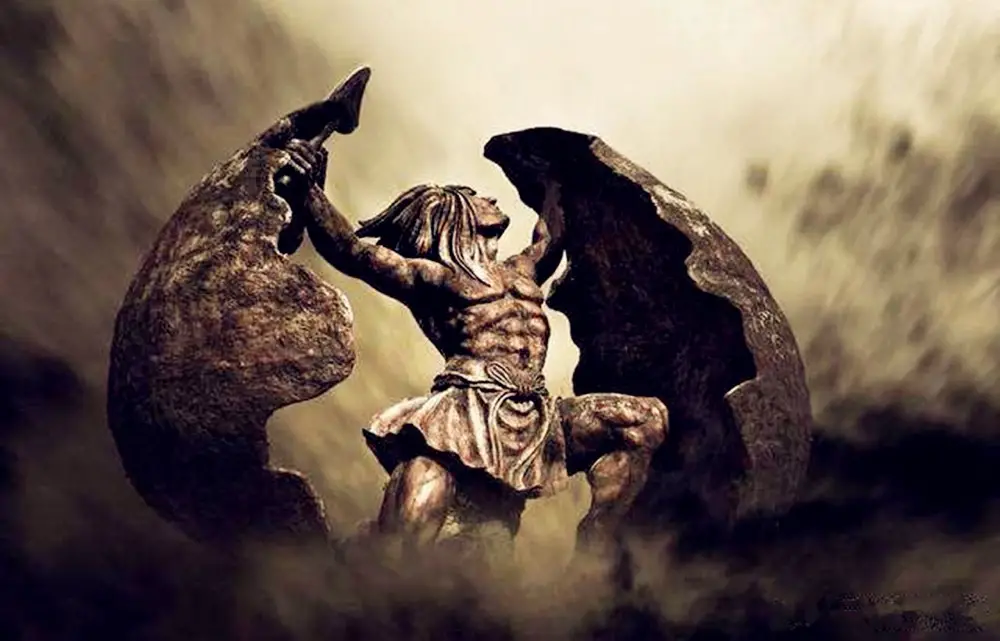
Fu Xi vs.Yellow Emperor
Fu Xi and the Yellow Emperor are both important figures in Chinese mythology and history. Here are some key differences between them:
Origin: According to legend, Fu Xi was born to a human mother and a dragon or snake father, while the Yellow Emperor was born to a human mother and a star deity father.
Contributions: Fu Xi is credited with many important cultural and societal innovations, such as the creation of the Bagua (Eight Trigrams) and the invention of fishing and hunting tools. The Yellow Emperor, on the other hand, is said to have contributed to the development of Chinese medicine and agriculture, as well as the founding of the Yanhuang culture.
Time period: Fu Xi is generally considered to have lived in the early third millennium BC, while the Yellow Emperor is believed to have lived in the late third millennium BC.
Relationship: Some legends suggest that the Yellow Emperor was a contemporary or even a student of Fu Xi, while others portray them as separate figures who made their own unique contributions to Chinese history and mythology.
Overall, while Fu Xi and the Yellow Emperor share some similarities and may have even influenced each other’s legacies, they are distinct figures with their own important roles in Chinese culture and history.
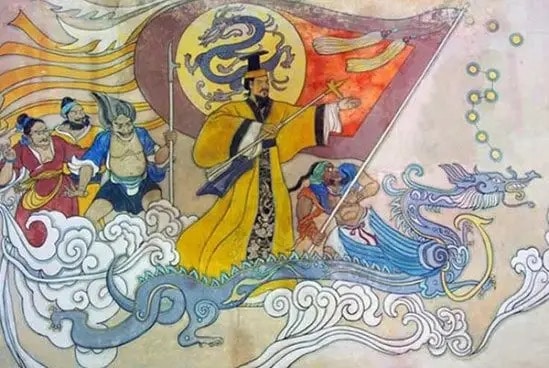
Fu Xi vs.Emperor Yan
Fu Xi and Emperor Yan are both important figures in Chinese mythology and history.
According to legend, Fu Xi was the first of the Three Sovereigns, who were mythical rulers of ancient China. He is credited with many accomplishments, including the creation of the Bagua (Eight Trigrams), which are used in divination and martial arts. He is also said to have taught people how to fish, hunt, and farm, and to have created the first musical instruments.
Emperor Yan, also known as Yan Di, was another legendary ruler of ancient China. He is considered to be the ancestor of the Chinese people and is credited with many achievements, including the invention of the calendar and the control of floods. He is also said to have defeated a dragon and established his capital at Banquan, in present-day Yan’an, Shaanxi Province.
There is no record of any direct conflict or competition between Fu Xi and Emperor Yan in Chinese mythology or history. Rather, they are both revered as important figures who made significant contributions to Chinese civilization.
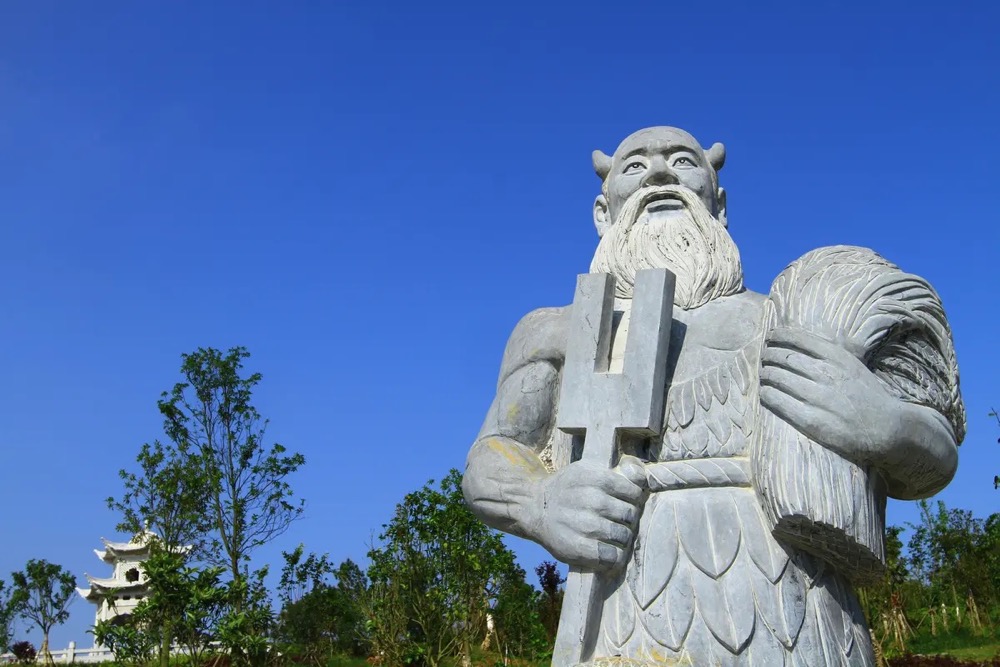
Fu Xi vs.Qin Shi Huang
It is not possible to compare Fu Xi and Qin Shi Huang, as they were separated by thousands of years and lived in vastly different historical contexts. Fu Xi is a legendary figure from ancient Chinese mythology who is credited with inventing writing, fishing, and hunting, while Qin Shi Huang was the first emperor of a unified China and is known for his military conquests, his construction of the Great Wall, and his efforts to standardize the Chinese script and measurement system. While both figures are significant in Chinese history, they occupied very different roles and cannot be directly compared.
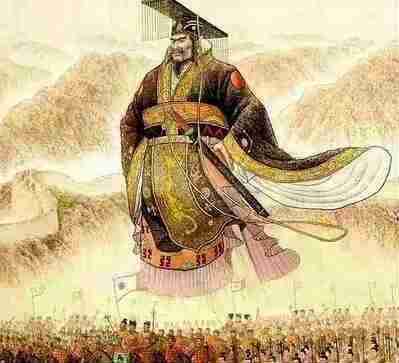
Fuxi Nuwa vs. Adam and Eve
Fuxi and Nuwa are figures from Chinese mythology who are believed to have played a crucial role in the creation and development of human civilization. Adam and Eve, on the other hand, are central figures in the Abrahamic religions of Judaism, Christianity, and Islam, who are believed to be the first human beings created by God.
While both stories involve the creation of human beings, the details and beliefs surrounding them are quite different. In the Chinese mythology, Fuxi and Nuwa are described as having created human beings out of clay and imbuing them with life. They are also credited with developing early forms of agriculture, hunting, and fishing, as well as inventing many important tools and technologies.
In the story of Adam and Eve, they were created by God in the Garden of Eden and given the freedom to live in paradise. However, they disobeyed God’s command not to eat from the tree of knowledge of good and evil, leading to their expulsion from paradise and the beginning of human suffering and mortality.
In conclusion, Fuxi is a key figure in Chinese mythology, and his contributions to Chinese society are immense. He is revered as a cultural hero and a wise teacher, and his teachings on balance and harmony continue to inspire Chinese people to this day. As China continues to grow and develop in the modern world, Fuxi’s legacy remains an essential part of Chinese culture and identity.